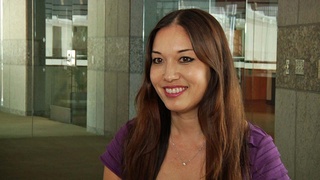Interviews
Difficulty responding to the question "What are you?"
People come in—the pictures are usually pretty easy, people come in, they sit, I shoot five, ten, fifteen photographs, they look at ‘em, they pick one they like, and then I give them this piece of paper where they sit there with this 7-x-7 piece of paper and I’d give them a pen, and I’m like “Okay, I want you to respond to the question, ‘What are you?’” And some people show up at these shoots, they’ve got eight pages hand-written, and I’m like “I can’t take that, it’s gotta fit here, it’s for a book.” And some people sit there and they write, and they crumple it up, and they write, and they crumple it up.
And I had one girl I shot in L.A., in Brentwood, where she sat for three hours with a piece of paper and a pen, and her boyfriend’s sitting with her, he was real polite, and I went over and I said “Just write something, I’ll give you more paper, just start it, get the process going.” And she’s like “No, no, no, no, no, it’s okay.” And then about an hour later I came by again, nothing—the boyfriend finally left. I kept shooting, I finished the shoot, we’re wrapping up, we’re striking the whole—the whole set’s going down, and I finally said “I have to go,” and she just looked at me, and she’s like, “I can’t do this” and she just dropped it and left.
And I realized that it was just—some people have never thought about these things before, and some people have thought about them a lot and it brings back a lot of pain as a kid, or it brings back certain things out of their past, and you know, it’s a powerful thing to actually define who you are.
Date: May 3, 2006
Location: California, US
Interviewer: Jim Bower
Contributed by: Watase Media Arts Center, Japanese American National Museum.
Explore More Videos

On Challenging Institutions
(1938-2020) Japanese American attorney and civil rights activist

Pop and Balls
(1938-2020) Japanese American attorney and civil rights activist

Re-examining Identity
(1941-2018) Japanese Canadian photojournalist and activist

Fitting in to both sides of her family
Jewish Japanese American journalist


Culture is an important part of one's identity
Jewish Japanese American journalist



Conflicted about immigrating to America (Japanese)
(b. 1925) War bride

Defining "Nikkei"
(1941-2018) Japanese Canadian photojournalist and activist

Unique Identity from Having Multiple Backgrounds
(b. 1938) Philipines-born hikiagesha who later migrated to the United States.

Growing up Japanese in Hawaii
(b. 1952) Former banking executive, born in Hawaii



Parents identification as Peruvian Okinawan
Okinawan American whose parents are from Peru.
